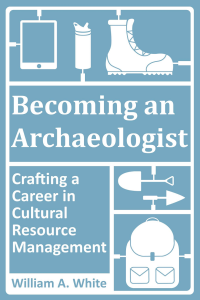 Cultural resource management archaeology did not exist the last time the world suffered a massive pandemic like COVID-19. We don’t know how the industry or its practitioners will react to global shutdown and rapidly-spreading illness, but we know what happened when our ancestors faced similar conditions. The 1918—1919 Influenza Pandemic is the most recent worldwide illness that we can compare to the current crisis.
Cultural resource management archaeology did not exist the last time the world suffered a massive pandemic like COVID-19. We don’t know how the industry or its practitioners will react to global shutdown and rapidly-spreading illness, but we know what happened when our ancestors faced similar conditions. The 1918—1919 Influenza Pandemic is the most recent worldwide illness that we can compare to the current crisis.
According to the Centers for Disease Control (CDC):
- The 1918 Spanish Flu was a variant of H1N1, which still infects people each year.
- In the United States the pandemic started in April, 1918. It was still raging in April, 1919 when President Woodrow Wilson collapsed from getting it in Paris.
- An estimated 500 million people (1/3 of the world’s population) got infected.
- At least 50 million died worldwide.
- 675,000 deaths occurred in the United States.
- Governments tried isolation, quarantine, practicing good hygiene, using disinfectants, and cancelling public gatherings. The Flu still ran its course for 18 months.
This is sobering news and I didn’t mean to scare anyone. I just want folks to be aware of what we are facing. If COVID-19 is anything like what swept the world 100 years ago, we are in for a wild, life-changing next few months.
Archaeologists are students of human pasts but we live in the present. The future results from what we do right now. Archaeologists are uniquely positioned because we can use what we know about the past to guide our futures, if not the rest of humanity. Here are six COVID-19 survival tips.
DISCLAIMER: The following tips are based on my own personal survival strategy. I am not a psychologist, virologist, emergency response professional, politician, medical doctor or anyone close to the flames on this pandemic. I am just a guy that happens to be a husband, parent, sibling, archaeologist, and American. These tips summarize what I am doing to make sure I can still do cultural resource management archaeology when this pandemic is over.
Please consult medical and local emergency response professionals if you have any technical questions. Do not break the law or go against medical recommendations:
1) Pay attention to health and safety guidelines: The 1918 Flu Pandemic kept spreading because people continued to congregate en masse. From World War I trenches to Armistice Day celebrations, getting close to each other kept the infection roiling around the globe.
Keep yourself healthy by doing what you can to limit chances of exposure. If you’ve been reading this blog for any length of time, you know how I feel about occupational health and safety— No archaeological site or project is worth getting hurt or dying for. Health and safety rules exist to minimize the change for you to get hurt. Failure to follow the rules increases your chances of injury. Nothing about this pandemic has changed my mind about occupational health and safety. Engineer away the potential for risk by staying home, maintaining good hygiene, and keeping distance when outdoors.
I know we all need to make a living, but, if you have to work, do it safely. Keep your distance, if possible. Cover your mouth if you’re sick. Stay home if you can.
2) Tune Out Distraction: Right now, the mediascape is a polluted wasteland of panic, pandemonium, and (dis)information. Thirty minutes on social media is enough to send you scrambling for the last dust mask and roll of toilet paper in your town. The world is not going to end from this but your grasp on reality will if you spend too much time on social media, news websites, and talking to your panicked friends.
I know you need information but I recommend you ration your exposure to news media. Set a 25-minute timer and only scan the news a couple times each day. For updates on COVID-19, focus on real sites like the CDC or World Health Organization. Stay away from anything that isn’t an interview with a real scientist and be wary of what politicians and pundits say.
Do the same for social media, or do what I’ve done—delete it from your phone/tablet and only use it once in a while on your laptop. I’ve almost eliminated social media from my life because my feeds got so toxic they were adversely affecting my mental health. Social media is like bad gossip; it gives you a dopamine hit to hear bad news on social media but these websites are designed to change your brain chemistry, change your beliefs, and waste your time.
Also, leave your phone in another room far from you for part of the day. I’ve noticed that a huge number of my friends, family, acquaintances, co-workers, and students are smartphone junkies. Every second of downtime is filled by staring at a smartphone. Cut the smartphone addiction, which shrinks the grey matter in your insula and temporal cortex, by quarantining your phone. Scanning your phone for 10 hours each day during this shelter-in-place time is going to ruin your mental health and brain chemistry, turning you into a “Screen Zombie.” Do yourself a favor and trade that bullsh*t screentime for something more productive. Set aside a few hours each day without staring at your phone.
 3) Increase your knowledge: Remember all those books you bought and articles you downloaded but never had the time to read? Well, now’s that time.
3) Increase your knowledge: Remember all those books you bought and articles you downloaded but never had the time to read? Well, now’s that time.
Once you’ve nested in home, quarantined your social media accounts, and cached your emergency reservoir of toilet paper, you can replace stagnant screentime with productive learning. Set aside significant time to work on your archaeology knowledge and skills. You could come out of this a self-made expert in geoarchaeology, prehistoric ceramics, lithic technologies, historical artifacts, or the prehistory/history of your area. For example, I’m reading a lot on ceramic petrography, designing online classes, and risk management for archaeology fieldwork right now.
You could also improve some of your transferrable skills right now. Improve your technical writing skills by reading “The Elements of Style,” “How to Write A Lot,” or any other academic writing book. Then, put those skills to the test by firing up your laptop and letting Microsoft Word roll. Get better at GIS by learning how to make maps in QGIS. Learn how to build 3D models on Blender. Learn how to make screencasts on OBS. Use this time to expand your skillset so you’ll be a leaner, more skilled archaeologist when the pandemic ends.
Gamify this by using a timer or word goal each day. For example, I have a goal of writing for at least 50 minutes each day. I break this down into two 25-minute blocks scheduled for the first thing I do each morning. In the past, when I had looming deadlines, I’d set goals like 1000 words each day. “Writing” in my world means any archaeology-related reading, research, typing words, or editing what I’ve already written. I do this six days each week, all year round. Shelter-in-place just allows me to convert my commute time to writing time.
I used to give myself small rewards but, now, I usually consider the 5 or 10-minute breaks between these sessions a reward in themselves where I walk around, shoot hoops if I’m at home, or silently read a book for fun.
You could also use your quarantine time to learn an entirely different skill. Get better at a hobby or start learning-up on something you can use to make money in the predicted recession/depression/economic downturn.
4) Make financial preparations: As I write, the Dow Jones Industrial Average has lost about 34% of its value in a month. By comparison the DJIA fell 37% over five months in 2008—2009 during the Great Recession, which was a bear market that lasted for about 18 months. Most of us old-time CRMers remember what happened during the Great Recession. In 2020, we’ve only just begun to forget those nightmares just in time for the next one.
The future is unknown as I write this blog post. The financial efforts central banks are making right now might prevent a recession. For the first time in my life, the government might do something right. Nevertheless, I suggest CRMers start taking action to prepare themselves for tough times ahead.
I have been an evangelist for CRMers starting a side hustle for years. I suggest we all take this sequestration time to make some forward progress on that side hustle that just hasn’t become a reality. You’ve got the time. Check out these resources:
http://www.succinctresearch.com/all-archaeologists-need-a-side-hustle/
https://www.archaeologypodcastnetwork.com/crmarchpodcast/158
Making the first dollar is the hardest part. One way to get the ball rolling is to make a promise to yourself that you will make $100 outside your paycheck before the shelter-in-place order is lifted.
The easiest way to do that is to sell some of the crap you already have laying around your house. Unless you’re an extreme minimalist, you probably have some stuff you can sell on craigslist, eBay or Letgo—enough to get you over the $100 hurdle. Stay safe while doing this. Maintain social distance and obey all quarantine laws, but make an effort to sell at least $100 of stuff over the next few weeks. Once you’ve immersed yourself in those waters, you can keep this going by buying stuff from yard sales, swap meets, and consignment stores that you can sell online or through Letgo.
Another way to get going is to start some sort of online hustle. Writing ebooks, doing SEO, web design, being a virtual assistant, or starting an online store are all ways you can make money on the internet. I’m not going to belabor this point but I think building your side hustle before layoffs and economic depression sets in is a good idea.
At the very least, cut back on your expenses and start saving as much as you can. We are entering an once-in-a-lifetime buying opportunity just like 2008—2009. Your fortune awaits.
 5) Pay attention to reality: All of this is probably hitting you like a ton of bricks. Uncertainty is, perhaps, the most destructive force in human history because it causes us to take drastic actions that increase our likelihood of hurting other people. The COVID-19 pandemic is a catalyst for alarm and panic caused by uncertainty.
5) Pay attention to reality: All of this is probably hitting you like a ton of bricks. Uncertainty is, perhaps, the most destructive force in human history because it causes us to take drastic actions that increase our likelihood of hurting other people. The COVID-19 pandemic is a catalyst for alarm and panic caused by uncertainty.
One of the only ways I’ve been able to stave off anxiety over this is by being mindful of what is actually happening around me. I’ve been using two main techniques:
RAIN: Recognition, Acceptance, Investigation, and Nurturing. Meditation teacher Tara Brach describes this best:
- Recognize what is happening,
- Allow the experience to unfold, just as it is,
- Investigate with interest and care,
- Nurture your emotional response with compassion, awareness, and understanding.
This will take practice and, when your emotions are exploding off the charts, you might find yourself on an emotional roller coaster. But, I’ve found RAIN to be a useful way of addressing all sorts of fears and mental stressors. I’ve used it to deal with imposter syndrome, public speaking nervousness, handling raging children, getting pis*ed off at my wife, fear of financial loss/difficulties, living with my father’s death, worrying about my aging mother, depression, racism, anger, and the list goes on. I’ve also use RAIN to cultivate awareness of happy moments, career successes, having fun with my siblings and mom, loving my wife and kids, sunny days, going on vacation, finding amazing artifacts, traveling to exotic places to do archaeology (like Primm, Nevada), getting stuff done, buying a new car, enjoying equanimity, and that list also goes on.
Awareness of the present moment: This one is easier than RAIN and can be practiced any time. Whenever you think about it, simply:
- Take a deep breath,
- Use your ears, eyes, nose, and touch to notice what is happening around you at this very moment.
- Keep breathing and keep being aware for as long as you like.
That’s it. You just breathe and pay attention to sounds, sights, touch sensations, ect. This isn’t as heavy as RAIN but it still brings you back to the present moment, which cuts through your mind’s constant voices, narratives, and circular conversations. Sometimes a couple deep breaths is enough to restart your concentration or stop a negative thought spiral.
6) Think about human success stories: Archaeologists know Homo sapiens sapiens has been around for tens of thousands of years. Our hominid ancestors were around much longer than that. Over the last 150,000 years, humans have survived climate change several times, plagues, wars, pogroms, genocide, atomic bombs, biological attacks, terrorism, economic depressions, and random violence.
“This types of sh*t happens ev-er-y day.” Today is no different. Neither is tomorrow.
Our ability to respond to adversity is our biggest advantage as a species. I am confident that the human race will survive COVID-19 pandemic and any associated economic crisis so we can get on to bigger things like addressing climate change and colonizing other planets.
In this time of crisis, it is useful for all cultural resource management archaeologists to think about our successes as a human race and individuals. Read inspirational memoirs from leaders from our society as well as tales of triumph from groups who have pulled through pogroms, genocide, and slavery. Cultural anthropologies of survivance could help you survive staying in your apartment for 30 consecutive days. If you’re into deep-time histories you could read about the biological and genetic characteristics that have allowed our population to swell to over 7.7 billion wonderful, precious, unique persons. Every day, biological anthropology is making discoveries that expand our understanding of our species. Or, you could learn about what makes us tick—how our minds help us overcome obstacles and survive in an ever-changing world. Let psychology, spirituality, or sociology guide you on that pathway.
Pandemics are not new to the human race. The best part is the 1918 pandemic changed our medical systems for the better. We learned more from this pandemic than any previous one. Doctors had developed a flu vaccine by the 1940s. Millions died but hundreds of millions survived. It is likely we will avoid COVID-19 causing this much death as our medical systems are much better than they were 100 years ago. Since there are more people alive, statistically, there should be even more survivors. Human beings can weather this storm as we have other pandemics in the past. As students of the past, cultural resource management archaeologists can use our knowledge of human behavior to best position ourselves to thrive after this pandemic passes and help guide our friends and relative towards truth, fact, and reality.
The last thing I want you to do is sit on your couch with your smartphone in one hand, binge-watching Netflix to get you through your social media-induced COVID-19 panic attack. You should be worried about this illness and the economy but worrying about this isn’t going to help anything. I ask all CRM archaeologists to stay healthy, be busy, and get ready to thrive in the upcoming New World.
Join the COVID-19 self-improvement movement! Write a comment below or send me an email.
 Having trouble finding work in cultural resource management archaeology? Still blindly mailing out resumes and waiting for a response? Has your archaeology career plateaued and you don’t know what to do about it? Download a copy of the new book “Becoming an Archaeologist: Crafting a Career in Cultural Resource Management” Click here to learn more.
Having trouble finding work in cultural resource management archaeology? Still blindly mailing out resumes and waiting for a response? Has your archaeology career plateaued and you don’t know what to do about it? Download a copy of the new book “Becoming an Archaeologist: Crafting a Career in Cultural Resource Management” Click here to learn more.
Check out Succinct Research’s contribution to Blogging Archaeology. Full of amazing information about how blogging is revolutionizing archaeology publishing. For a limited time you can GRAB A COPY FOR FREE!!!! Click Here
 “Resume-Writing for Archaeologists” is now available on Amazon.com. Click Here and get detailed instructions on how you can land a job in CRM archaeology today!
“Resume-Writing for Archaeologists” is now available on Amazon.com. Click Here and get detailed instructions on how you can land a job in CRM archaeology today!
 Small Archaeology Project Management is now on the Kindle Store. Over 300 copies were sold in the first month! Click Here and see what the buzz is all about.
Small Archaeology Project Management is now on the Kindle Store. Over 300 copies were sold in the first month! Click Here and see what the buzz is all about.
Join the Succinct Research email list and receive additional information on the CRM and heritage conservation field.
Get killer information about the CRM archaeology industry and historic preservation.



